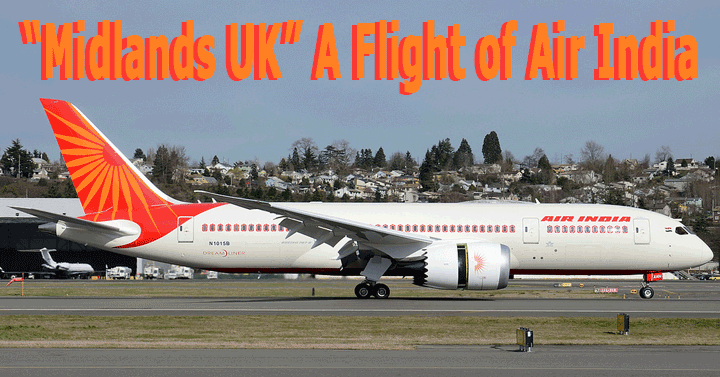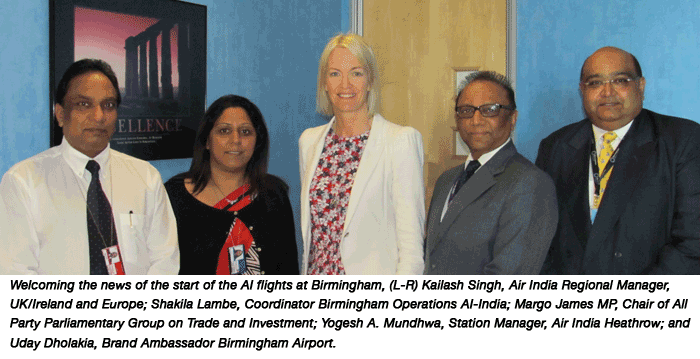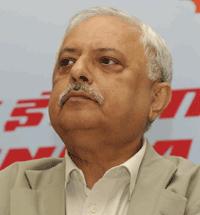| 
On August 1, 2013, Air India launched
four times a week service to Britain’s Birmingham Airport from Delhi
with the new Boeing 787-800 ‘Dreamliner,’ despite a report
in late July that smoke was observed coming out of one of the aircraft's
food warming ovens.
Whether the smoke was caused by an errant
piece of burned Naan bread or something else a bit nastier is yet to be
revealed.
But it is safe to say that getting the beautiful
new bird to land in his city is a credit to the tireless efforts of Birmingham
Airport’s Brand Ambassador for Asian Markets, Uday Dholakia, along
with a host of others.
A direct result of the significant support
from the city of Birmingham, and indeed the region, for a direct service
to India, Dholakia spelled out the need of the region:
“I am repeatedly told by the Midlands
Indian community that they want direct connectivity from their region
to India to enhance trade and to reach family members easily, so this
news will be greatly welcomed by business and leisure travellers.”
 |

The new B787 aircraft flights will enhance
trade, academic links, and inward investment opportunities for the wider
Midlands region. As the Midlands is fast developing as center for supply
chain-enhanced manufacturing in Automotive, Food and Drink, and Pharmaceuticals
and Engineering, the potential for point-to-point cargo is immense and
the airport is actively looking to develop this.
“The airport team too,” said
Dholakia, “never lost sight of the local need for the service.
“It is particularly great news that
the brand new Dreamliner will be operated on the route and we urge agents
and independent travellers to use the Birmingham-Delhi service going forward,”
he said.

Located in the heart of England, Birmingham
is the UK’s second largest city and is home to five times more Indians
than Manchester. In fact, the West of the Midlands region accounts for
15 percent of the total number of Indians living in England—some
200,000 people.
From a cargo perspective, too, the Midlands
offers an established, ready market for Indian perishables and high-value
heritage products. With dedicated freight handling facilities and the
airport’s close proximity to the biggest wholesale markets in Birmingham
and major supermarket distribution centers within an hour’s drive,
fruit and vegetables could be on the plate in less than 24 hours after
leaving Delhi.

With this vast potential for both cargo
and passenger operations, it was indeed a wonder why Birmingham Airport,
the second largest airport outside of London, did not have a direct service
to India.
Said Neil Rami, Chief Executive, Marketing
Birmingham, who was in Delhi for the launch of the Air India flights:
“The demand has always been from the local community.” In
fact, there was a signature campaign with 20,000 people signing a petition
for a direct flight with India.
More importantly, said Rami, the flight
was a result of what has happened over the last five years in the region.
“We have seen significant investment from India into the Birmingham
region. Currently, we have more Indian investment in our region than any
other region in UK or outside London. The Tata investment in Jaguar and
Land Rover has particularly created a lot of opportunities, not just in
advanced engineering but also in life sciences and business process outsourcing
companies like Tata Consultancy and Wipro, bringing a lot of Indian investment
into our area. There is also a lot of trade and there is a lot of demand
from the local corporate market to see this direct route. On the back
of that we are now seeing opportunities for cargo. So clearly, this is
important to us economically.”

“The Indian investment over the last
few years has been supporting around 25,000 jobs in the Birmingham area.
Hence, it is a major economic priority. It (the direct flight) is something
that we have been working closely with our colleagues at the airport for
some time.”
The airport, too, is enthusiastic about
the flights. Said Jo Lloyd, Birmingham Airport’s Director, Marketing:
“We have worked very hard in the last two-three years…”
and went on to emphasize that this was the right time for the flights
to start. “We believe and hope that, perhaps, the services will
quickly move to a daily flight, subject to the demand.”
Lloyd also mentioned that the traffic would
“be a mix of business and leisure travel.” Additionally, there
would be “outbound business traffic as well. A lot of companies
based in our region or those doing business with companies based in India
grow as well because it’s a two way activity,” she said.

 In
addition to the Birmingham flights, Air India is on a fast-forward mode
to connect to foreign destinations. From the end of August, the carrier
will start daily non-stop flights from Delhi to Sydney and Melbourne.
With the launch of these services, Air India would become the first airline
to operate the new Boeing-787 Dreamliner to the Australian continent. In
addition to the Birmingham flights, Air India is on a fast-forward mode
to connect to foreign destinations. From the end of August, the carrier
will start daily non-stop flights from Delhi to Sydney and Melbourne.
With the launch of these services, Air India would become the first airline
to operate the new Boeing-787 Dreamliner to the Australian continent.
Said Deepak Brara, (right) Air India’s
Director (Commercial), “These new flights signify that Air India
is entering a phase of expansion, growth, and profitability that had been
delayed due to the induction of the B787. All this would have occurred
much earlier,” he pointed out. He went on to add that after decades,
“we have the B787 flying to London, Frankfurt, and Paris and we
have plans for the Dreamliner to fly to Rome and Milan.” The flights
have brought in cash surpluses and profits. An ecstatic Brara pointed
out: “We are confident that Air India is on the road to recovery
and profitability.”
Tirthankar Ghosh
|









 In
addition to the Birmingham flights, Air India is on a fast-forward mode
to connect to foreign destinations. From the end of August, the carrier
will start daily non-stop flights from Delhi to Sydney and Melbourne.
With the launch of these services, Air India would become the first airline
to operate the new Boeing-787 Dreamliner to the Australian continent.
In
addition to the Birmingham flights, Air India is on a fast-forward mode
to connect to foreign destinations. From the end of August, the carrier
will start daily non-stop flights from Delhi to Sydney and Melbourne.
With the launch of these services, Air India would become the first airline
to operate the new Boeing-787 Dreamliner to the Australian continent.